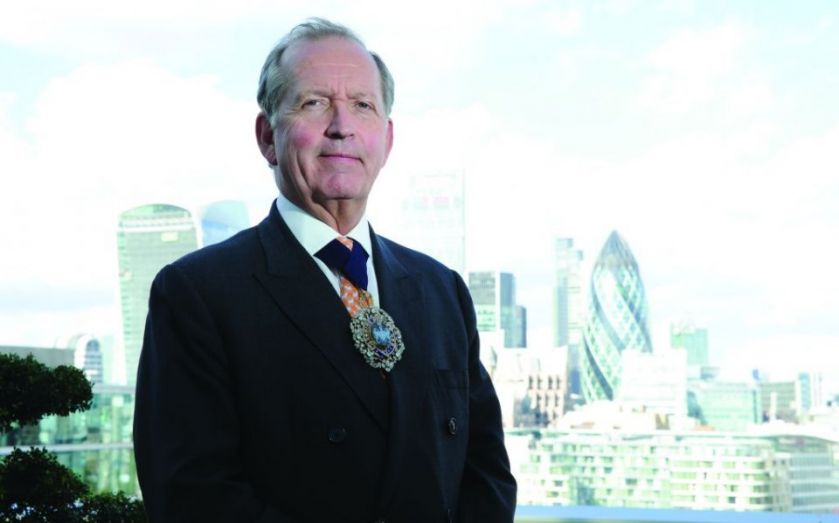Lord Mayor Alan Yarrow wants to start the City talking about empowering disabled workers

Almost halfway through his mayoralty, despite the rigours of constant travel, Alan Yarrow is buzzing with energy. The former Kleinwort Benson veteran, and chairman of the Chartered Institute for Securities & Investment (CISI), clearly relishes the novel experience of swapping the cut and thrust of the workplace for his apolitical role representing the City’s interests. Above all though, he is energised by a cause that for him is both personal and professional.
This week, the Lord Mayor will host the first in a series of power breakfasts. Taking up the baton from Fiona Woolf, Yarrow is widening the mayoralty’s focus on diversity at work to include disability.
Yarrow’s own son Max was born with a learning disability. That taught him great respect for Mencap and Scope – “they’ve been incredibly important supports of ours” – and the charities are beneficiaries of the Lord Mayor’s Appeal this year.
Yarrow saw not just the challenges, but also what the relationship with Max brought to his family. His other son Guy “has been raising money for Mencap ever since his teens”, and now runs the popular annual Mencap Dodgeball tournament. His wife Gilly was headmistress of Finton House in Wandsworth, a school where around 10 per cent of pupils have special needs. For him their integration into the school’s daily life showed very practically “how both benefited hugely from having them there, realising that not everyone’s perfect”.
As a result, Yarrow believes the workplace has been missing a trick in not working harder to integrate disabled staff. This isn’t simply a matter of social conscience, but tangible economic benefit. “We want to try and get people to consider when they are actually employing people that maybe it’s quite a good idea to increase the diversity into those people who are less able to look after themselves maybe physically but mentally can actually contribute a huge amount.”
There’s certainly evidence of an underused pool of disabled labour. A recent study for Scope by Landman Economics found that just a five percentage point rise in the disability employment rate (currently under 50 per cent) could increase GDP by £23bn by 2030, and bring £6bn more to the Exchequer.

The main beneficiaries of this year's Appeal share a float at the Lord Mayor's Show
The evidence from City firms already leading the way has also been striking. After Lloyds Banking Group improved its workplace adjustment process, 62 per cent of those using the service reported reduced absence, a potentially huge productivity gain, and there were steep declines in the cost of assessments.
Disability shouldn’t be seen too narrowly, either. One of this year’s breakfasts will address the vital topic of mental health and stress in the fast-paced world of the City. “I want to make people realise that every ten minutes a person with a disability is born. That’s why they shouldn’t be marginalised, they are mainstream.”
Still, it is early days. Yarrow is keen to emphasise these breakfasts are only about introducing and exploring the topic: “People are frightened of the unknown. And it’s about actually making sure they know they have people they can talk to about their concerns. You’ll see some companies that have gone for it in quite a big way and have genuinely got a lot of experience. This is about opening up about the good things, the bad things and actually seeing what benefit it has on people.”
He sees staff retention and satisfaction as an important part of that picture. “Making people proud of where they work is important. The younger generation aren’t all some sort of moneygrabbing, vicious superheroes. The reality is they think there is a social responsibility.”
He firmly rejects the idea of proposing any kind of quota, saying: “I think quotas are a bad idea. It’s a bit like going for a fixed exchange rate. You can’t force this issue. There are people who have got some disabilities but equally want to prove that they also are quite able to look after themselves. But they’ve got to get the opportunity.”
Yarrow must know he is at the start of a long and challenging conversation. But he doesn’t seem fazed.
He says: “The attitudinal change toward people with disabilities has been extraordinary. Thank god it has changed. We need to embrace it and the workplace should play its part. Every time I speak publicly, I say my six words. I say wealth creation, giving time and supporting people. That comes out religiously every time I speak. And until I start having it repeated back to me, I shall continue.”
The Power of Diversity breakfasts begin this Friday, 15 May. Booking details and further information at www.thelordmayorsappeal.org.
| A five percentage point rise in the employment rate amongst disabled adults below pension age would mean that, by 2030: |
|
THE EXCHEQUER WOULD GAIN £6BN GDP WOULD INCREASE BY £23BN |